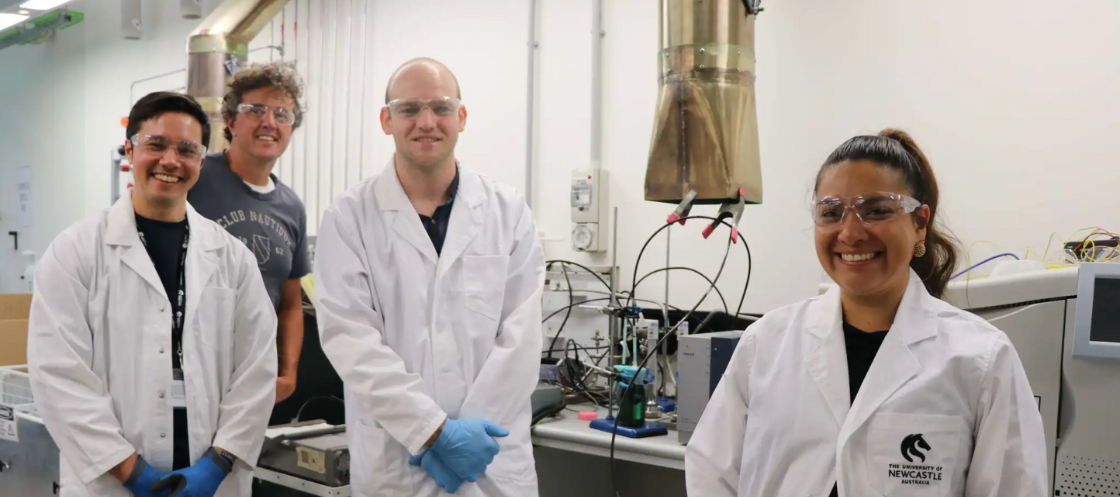Partnership and proximity power EM Energy’s hydrogen progress
Newcastle-based clean tech startup EM Energy has made swift progress in developing a technology that turns organic waste into green hydrogen — thanks to early support from TRaCE and close collaboration with researchers at the University of Newcastle.

To help build Australia's clean energy and recycling industries, the University of Newcastle and UNSW are working together on the $280 million Trailblazer for Recycling and Clean Energy (TRaCE) program. Funded by the Australian Department of Education, the program supports research and helps turn new ideas into commercial products in areas set out in the Modern Manufacturing Strategy.
EM Energy was the first startup to receive a Trailblazer for Recycling and Clean Energy (TRaCE) R&D voucher, which they used to test the feasibility of their Organic Hydrogen Electrolyser Cell (OHEC). This system produces hydrogen gas from organic materials like sugar cane waste, food scraps and even coal tailings — without releasing greenhouse gases.
Initial testing was carried out at the University of Newcastle, where researchers confirmed the system could produce clean hydrogen. The results gave the EM Energy team the confidence and technical data needed to develop a working model.
“Once we finished the technology validation project at the University, we started scaling up our organic feedstock,” said Ms Kesha Manimaran, EM Energy Research Assistant.
“We were no longer able to do it at laboratory scale, so we moved into a workshop with a larger hydrogen reactor.”
The company’s move into a larger facility in Mayfield North marked a step forward in their efforts to increase production capacity. But the support they received didn’t end with technical testing.
Through the TRaCE Mobility Fellowship program, Ms Manimaran was also embedded in the university team to continue project work more closely.
“The TRaCE fellowship has enabled us to collaborate closely with the University of Newcastle’s research team by co-locating our teams. This proximity has fostered seamless collaboration, allowing us to efficiently tackle the challenges of developing, testing, and validating new technology,” said Mr Chris Wilson, EM Energy Co-Founder and Director.
EM Energy’s co-founders, Ms Isabel Toasa and Mr Wilson, both pointed to the value of the broader support they received from TRaCE. This included access to office space at the Newcastle Institute for Energy and Resources (NIER), research infrastructure and opportunities for industry exposure.
“It allowed us to adapt quickly to data and any challenges that arose throughout the feasibility study,” said Ms Isabel Toasa.
“If we had tried to do this project just by ourselves, it would have taken longer and cost more.”
The company also took part in the TRaCE-supported I2N Cleantech Accelerator program, which helped them build networks and prepare for future investment.
“Being part of the I2N Cleantech Accelerator gave us more recognition and opportunities to pitch and network with investors. It was a great experience for networking,” said Ms Kesha Manimaran.
With their technology now in a more advanced stage, EM Energy is focused on refining the system to improve hydrogen output and explore how its by-products might be used.
“Being in the startup space and watching the progress and challenges of scaling this technology is a unique experience,” said Ms Manimaran.
“While it can be a bit challenging at times, it is exciting to be part of something so innovative.”
TRaCE continues to offer R&D vouchers to eligible startups and small-to-medium businesses working on recycling and clean energy technologies. The program provides matched funding and access to research expertise, aiming to make early development more affordable and collaborative.
















